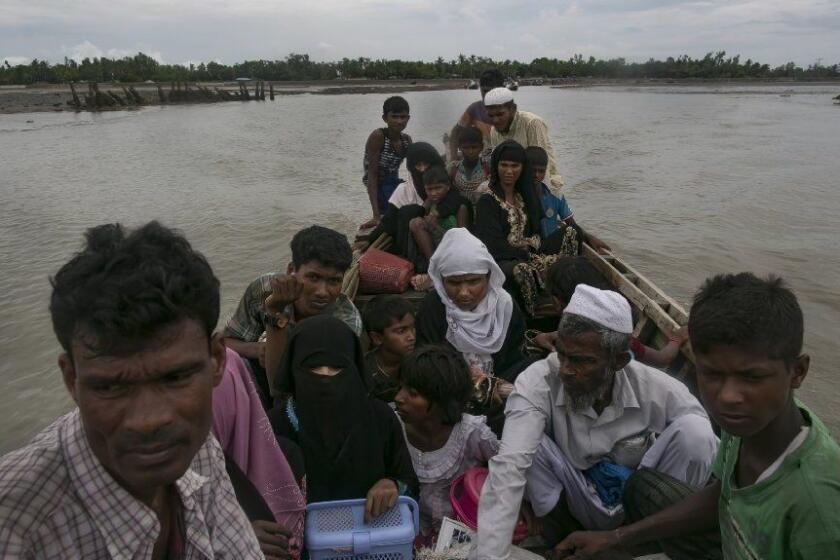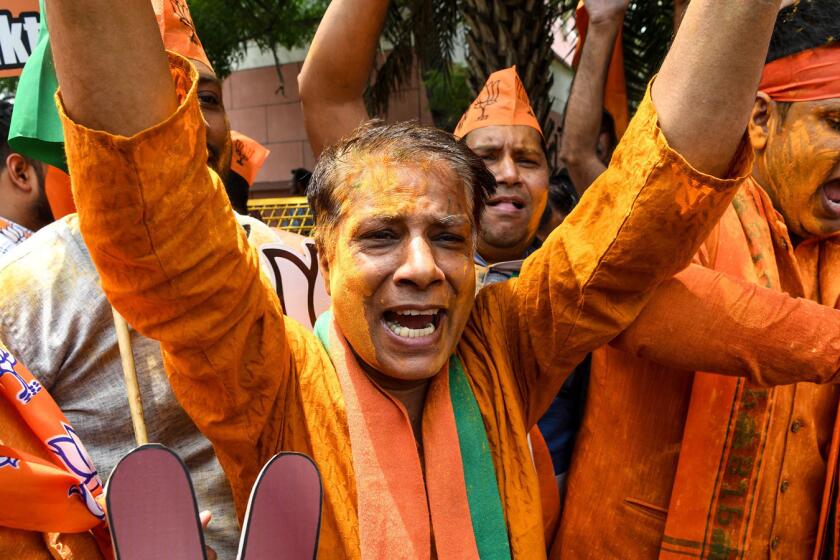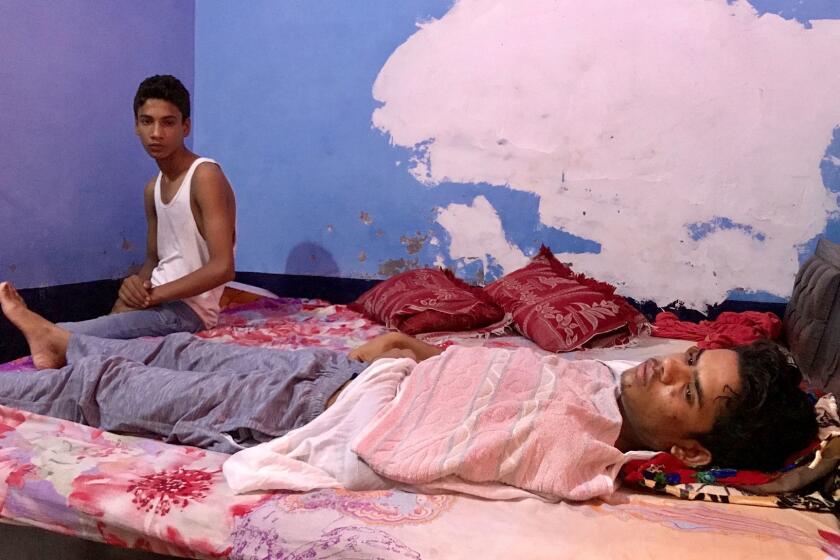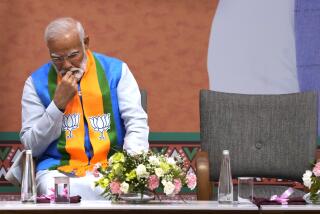How a new law moves India closer to being ‘a Hindu country’
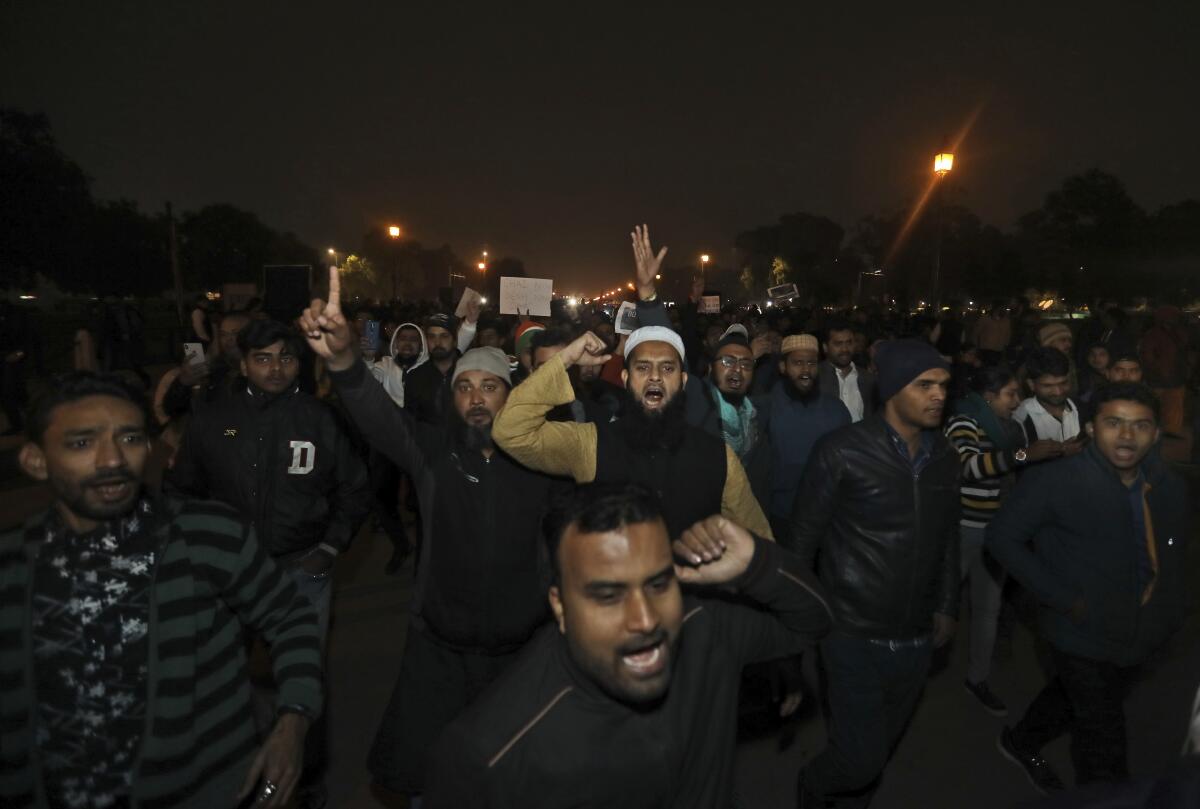
- Share via
The scenes from the world’s largest democracy are startling. Indian police have stormed college campuses, spraying crowds with tear gas, beating students with sticks and hauling away hundreds. In cities nationwide, students have massed in peaceful vigils to protest the government’s actions.
The spark for the unrest is a new citizenship law that critics say discriminates against Muslims, who make up 14% of India’s 1.3 billion people, the largest religious minority in a country that is 80% Hindu.
Passed last week, the law to many represents the latest plank in a years-long project by Prime Minister Narendra Modi to remake India — founded as a secular, pluralist republic in 1947 — into a Hindu nation.
The protests mark the most significant public opposition to the popular prime minister in his more than five years in power, and risk damaging India’s international reputation at a time when the country is facing economic troubles.
Here’s more about the legislation and its place in Modi’s broader Hindu agenda:
What is the citizenship law?
The Citizenship Amendment Act sounds anodyne at first. It offers a path to Indian citizenship for refugees from three conflict-ridden neighbors — Afghanistan, Bangladesh and Pakistan — who currently live as migrants who are in the country illegally.
All three countries have overwhelming Muslim majorities. But the law offers only followers of six faiths — Hindus, Buddhists, Sikhs, Christians, Parsis and Jains — access to this fast-track process. Muslims are excluded.
Modi’s government argues that because the law applies to refugees from Islamic countries, India need not offer special protection to Muslims. “This act illustrates India’s centuries-old culture of acceptance, harmony, compassion and brotherhood,” Modi tweeted.
More than 400,000 Rohingya Muslims have streamed out of Myanmar in recent weeks, fleeing a bloody military crackdown that a top United Nations official described as “a textbook example of ethnic cleansing.”
Yet that compassion doesn’t extend to minority Muslim sects that face persecution, such as the Hazara and Ahmadi communities of Pakistan, and Rohingya refugees in Bangladesh — leading critics to label the law anti-Muslim.
Why are Indian Muslims worried?
The law follows a controversial citizens registry implemented this year in Assam, a state bordering Bangladesh that has a sizable migrant population. Nearly 2 million people, mostly Muslims, were judged to lack sufficient evidence of citizenship, forcing them to file legal appeals or risk becoming stateless.
As authorities in Assam erect detention centers for those who are declared foreigners, Modi’s top lieutenant, Amit Shah, who has described India as awash in migrants there illegally, has promised to roll out the registration process nationwide.
In a country where 1 in 5 births still goes undocumented, many Indians worry they could be omitted because of a lack of paperwork. Some could rely on the new citizenship law to gain status — but not Muslims.
Those fears fueled protests that began last week in Assam, where five people were fatally shot by police, and spread on Sunday to Jamia Millia Islamia, a historically Muslim university in New Delhi. The harsh police crackdown there sparked demonstrations at nearly 50 campuses nationwide.
“The protesters aren’t worried about something mundane like the economic slowdown,” said Sadanand Dhume, a resident fellow at the American Enterprise Institute in Washington. “They’re worried about waking up one day in a country that no longer treats them as fully Indian.”
India is 80% Hindu. How can it become ‘more Hindu’?
Modi’s Bharatiya Janata Party, India’s most formidable political machine in decades, is part of a global wave of nationalist parties that have swept to power by appealing to religious or ethnic majorities. The BJP believes India has been hampered by its secular tradition and by generations of political leaders who pandered to minority groups.
Indian Prime Minister Narendra Modi scored an overwhelming reelection victory on Thursday, winning a second five-year mandate while fighting off concerns about rising unemployment and his divisive Hindu nationalist policies.
“There is absolute political consensus within the BJP that India is culturally a Hindu country,” said Milan Vaishnav, director of the South Asia program at the Carnegie Endowment for International Peace.
Within the party, Vaishnav said, “the debate is really over how far the country should shift from the secular tradition, not whether it should in the first instance.”
Since Modi took power in 2014, BJP-led governments have rewritten textbooks to remove references to the Mughals, Muslims who ruled in pre-colonial times, and renamed cities that held Mughal or Muslim names.
They have passed laws banning the slaughter of cows — an animal revered by conservative Hindus — that have emboldened Hindu vigilantes and BJP supporters to attack suspected cattle smugglers. Dozens of people have been killed in lynchings, many of them Muslims.
Saira Bano slumped in a plastic chair, her delicate face drawn with grief.
After winning reelection resoundingly in May, Modi fulfilled a long-standing BJP goal by canceling the statehood of the volatile, disputed majority-Muslim border territory of Kashmir, bringing it under the direct control of the federal government.
Last month the Supreme Court ruled in favor of Hindu groups that have fought to build a temple on a disputed site where a mosque once stood in the northern city of Ayodhya. The mosque was torn down by Hindu mobs in 1992, sparking one of the worst periods of Hindu-Muslim violence since independence.
How has Modi responded to the demonstrations?
As Modi’s promises of economic reform and job creation have stalled, the BJP’s anti-Muslim rhetoric has grown sharper.
Shah, Modi’s home minister, has spoken of ridding the country of “termites” and “infiltrators” from Bangladesh. BJP leaders tell critics they can “go to Pakistan.”
Modi has been dogged by allegations of bigotry since 2002, when he failed to stop religious riots as leader of the western state of Gujarat. As protests flared this week, he told a crowd at a political rally that the instigators of violence could be “identified by their clothes” — a reference to the headscarves and shalwar kameez worn by some Muslim student demonstrators.
Meenakshi Ganguly, South Asia director for Human Rights Watch, said the prime minister “appeared to be threatening protesters” and called on the government to reverse the law.
How far will Modi go?
More protests are planned across the country this week, but the government shows no sign of backing down. India’s Supreme Court on Wednesday postponed hearing arguments challenging the constitutionality of the citizenship law until late January.
“Modi remains broadly popular, and voters have given him wide latitude to enact his agenda,” Vaishnav said. “So I would be surprised if these protests force a fundamental rethink.”
There is yet more that BJP supporters hope to change. The party has long demanded a uniform civil code that would erase separate Islamic laws governing marriage and divorce. Senior leaders back national legislation that would make it tougher to convert from Hinduism to Christianity or Islam, despite constitutional guarantees of religious freedom.
“In theory the backlash to the citizenship bill could give the government pause,” Dhume said. “But it’s just as possible that they decide to double down and achieve as much of their cultural agenda as possible while Modi remains largely popular among most Indians.”
More to Read
Sign up for Essential California
The most important California stories and recommendations in your inbox every morning.
You may occasionally receive promotional content from the Los Angeles Times.
